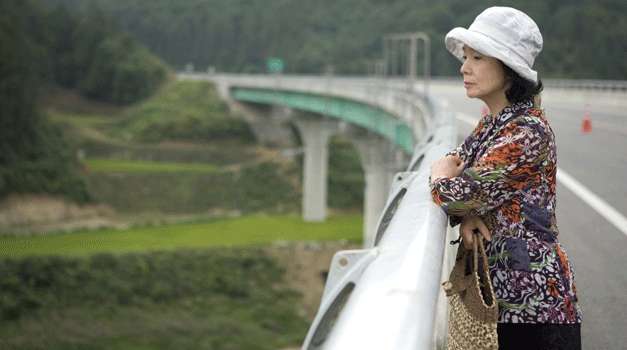 YOON JEONG-HEE IN POETRYA drowned girl, an elegant old lady, a search for beauty
YOON JEONG-HEE IN POETRYA drowned girl, an elegant old lady, a search for beautyAs in his last film,
Secret Sunshine (2007), Lee Chang-dong has drawn an exceptional performance from an actress playing the role of a single woman raising a child under difficult conditions. Mija (Yoon Jeong-hee, a veteran actress in her sixties who had not made a film in sixteen years) is raising her teenage grandson Jongwook (Lee David). Her daughter has moved to another town after divorcing.
Three things are going on. And they are serious things, a death, a crime, and a fatal illness. A girl is found in the river. She was a student at Jongwook's school and committed suicide after being repeatedly raped by five students. One of them turns out to be Jongwook. Mija is an elegant woman who sets off her slightly ravaged beauty by dressing nicely. She has had a fascinating past, and evidently was once a beauty. Now, however, she is reduced to working as a housekeeper for M. Kand (Kim Hira), a well-off shopkeeper who is damaged from a stroke. Visiting a doctor for a prickly feeling in her arm, she is instead diagnosed as probably being in the early stages of Alzheimer's disease. Instead of pursuing treatment or telling her daughter -- about the Alzheimer's or, later, her son's crime -- she impulsively joins an adult poetry class.
Throughout the film, Mija struggles to produce a poem, taking out a notebook to jot down ideas whenever she eats a fallen apricot or sees a pretty flower. She also attends meetings of a poetry group whose contributors are alternately maudlin, kitsch, or bawdy. The bawdy one turns out to be a policeman, and that becomes significant later. And what is maudlin or kitsch comes across as colorful artifact, not in any way spilling over into a story that could so easily have succumbed to treacle but instead remains tart and keenly observed. Still, one wonders if the poetry class theme needed to be so exhaustively explored: at 139 minutes, the film is again too long, as was the 142-minute
Secret Sunshine.The crime is only revealed later after much time has been spent following Mija's daily routines, which include a relation with the post-stroke man that verges on the intimate, and a growing sense of her openness, patience, and ability to cope -- but also a tendency to walk away from unpleasantness. The rapes are to be kept secret but four fathers of the other boys corral Mija to contribute to pay off and silence the mother, a rough woman from a poor rural family, to the tune of 30 million won (about $30,000). She wants to contribute but hasn't got the money. The idea of a legal settlement and cover-up seems repugnant and Mija's solution is hardly above reproach either. Ultimately there is poetic justice, however, in more ways than one in writing by Lee Chang-dong, who began as a novelist, that is both subtle and ingenious.
Meanwhile Jongwook is never anything but oafish and lazy when at home with his grandmother, disrespectful, dirty, the basic teenager from hell -- but quite believable and never overstated. She is sometimes severe with him but still in some ways indulgent. And at moments he can be cowed into submission and still seem just a boy. Occasionally they play badminton in the evenings in front of the apartment building; she's rather good at it. Later she gives an awesome performance at karaoke. Eventually Mija will find surprising solutions to all her problems, and will be the only student who comes up with a poem at the end of the session as the teacher had requested. It is a poem linking her with the drowned girl.
Poetry has moments that are obviously pushed and manipulative and it is sometimes predictable, but it is also neat in its dovetailing explorations of morality, social justice, and the search for meaning and beauty in life. I tend to feel uncomfortable in Lee Chang-dong's films, as if something isn't quite right. However, watching Yoon Jeong-hee is a continual pleasure. Not only are her scenes delicate and subtle, but she is a wonderful example of how an older woman can be beautiful and elegant -- and dignified even under great duress. And sometimes manipulativeness is forgivable when the arrangements make as satisfying a pattern as they do here. And the best moments, like the visit by Mija to the drowned girl's mother, when she does not do what she was expected to do and instead the delicacy of the character portrait is enhanced, have an unexpected and quite wonderful quality.
Seen as part of the New York Film Festival at Lincoln Center in September 2010. Shown at Cannes, where it was awarded the Best Screenplay prize, and at Telluride and Toronto with many other festivals to come. A Kino International release.





